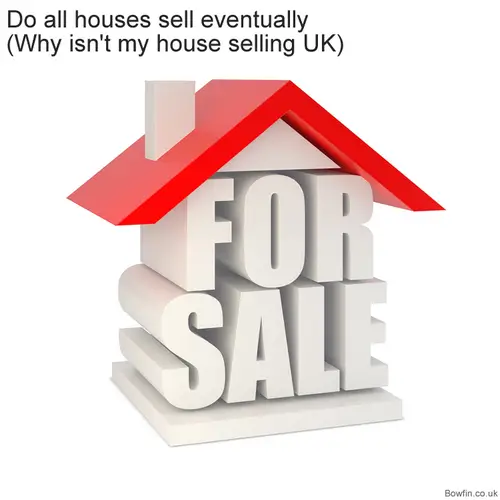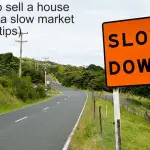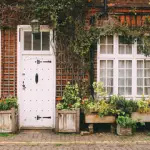
If you are stuck with a house that won’t sell, you are probably asking “do all houses sell eventually?” But probably more importantly, will your house sell eventually?
So do all houses sell eventually? To put your mind at rest, all houses will sell eventually. But houses only sell at the price equilibrium point. Which sounds a bit fancy, but it just means the optimum market price that generates the right demand for your house to sell at a price a buyer is prepared to pay at an amount you’re prepared to accept.
If your house has been on the market for longer than it should, this usually indicates the wrong list price. The best indicator of this is if you’ve had no viewings at all. But if you have had viewings, but no offers, ask your agent for the feedback they are getting.
If it was your estate agent who did the valuation on your house, be aware that estate agents sometimes get this wrong.
Be prepared to speak with another estate agent. Ask for a second opinion on your house’s value. Don’t get precious about it’s value though.
Do all houses sell eventually and what’s needed for a house to sell?
The reason why your house isn’t selling could be for any number of reasons. Let’s explore this further.
The reality is that mosts things, and in this case houses, will sell eventually. But this has to be at the right price. With any transaction there has to be a willing buyer and a willing seller.
The factors that influence whether a house will sell include the following factors:
- Price or valuation. The price has to be right for buyers to be interested in placing an offer.
- Condition of the property e.g. immaculate or run-down.
- Market factors, like interest rates, Brexit, time of year etc. will affect the price and how quickly a house sells.
- Type of house or property i.e. flat, bungalow, detached house, semi-detached etc.
- Location of the house, this is not just in terms of which area of the UK or which town or city, but also whereabouts the house is within that town or city.
- What’s around the house, e.g. a cattery, a dog kennels, a fast or noisy road or perhaps a landfill!
Every house has a price equilibrium point
For a house to sell, all the factors listed above need to align. Or alternatively, if these align in a negative way, the house will struggle to be sold. Let’s call this a price equilibrium.
For example, if your house is on a fast and noisy road, if you live next door to a cattery or a dog kennels and you back on to a landfill site, your buyers market has just been severely restricted.
They only way this house would sell is by reducing the price to entice more buyers. This would be the price equilibrium point.
Let’s say the house we are talking about is a three bedroom detached house. Let’s also assume that ordinarily it would sell for £300,000, but without all of the above obstacles in the way.
But if instead this house has the negative factors listed above, the price would need to be reduced to say £200-250,000 in order to sell.
Getting the valuation right is key to selling your house
This may seem like an obvious point to make, but it’s very important to strike the right valuation when you first put your house on the market.
If you get this wrong, you’ll end up missing the first wave of buyers. People mostly know whether a house is over priced or not. With the internet and websites like Zoopla and Rightmove, it’s very easy to work out what a house is worth.
Not only that, with other tools like Google Earth, it’s extremely easy to view your house from above to see what’s around it. If there’s a landfill nearby or a scrap merchant, these things can easily be spotted and may put many buyers off.
With less buyers there becomes less competition
If your house has factors that go against it, you will be reducing the number of buyers that would want to buy it. The more negative factors that are introduced, the lower the number of likely buyers, the lower the competition.
The lower the competition, normally the lower the price. Conversely, the more buyers there are for your type of house, the more likely there’s going to be competition. Which means you’ll therefore achieve a better asking price.
Your price needs to reflect the street value
The price you list your house on the market needs to reflect the value of similar houses on your street.
For example, if you live on a street of relatively similar three bed houses. If the average house price for a 3-bed house is let’s say £185,000, but yours is on the market for £225,000.
This will never sell, unless yours has something different about it. This could be an extension or perhaps yours is the end house with more of a garden. But on the whole the only reason it won’t sell is because it’s over-priced.
What about if your house is in bad repair?
If in the above example, let’s say that the 3-bed houses on the street are worth around £185,000. But to achieve this they need to be in a good state of repair.
However, if this were your house and it is in need of modernisation, it’s not going to be worth the full £185,000. For whoever buys your house they will need to fix it up before it can be worth the same as all the other houses.
It will then depend on how badly your house needs modernising. The worse it is the less it will be worth.
But the point with all these examples is that eventually your house will sell. But only if it’s put on the market at the right price. Or alternatively, if you’re happy to accept a realistic offer on the asking price, you will sell it.
This is about striking the right price and is about going back to the point of finding a willing buyer to match a willing seller.
How to create more interest in your house to get it sold
If your house is in a position which is let’s say less desirable, you need to think about reducing the price. This opens it up to a new group of potential buyers.
It may be you back on to a railway line. Or perhaps you’re near a busy dual carriageway or motorway. If you are, this will unfortunately put some buyers off.
By reducing the price, you open your house up to a group of buyers. This new group of buyers may not ordinarily be able to afford a house of your size or type, but for the railway or dual carriageway.
You may find there are people who want to move into your type of house. But at the right price, they may be prepared to overlook the problems just so they can buy a house they need. By reducing the price it makes your house cheaper than other houses of its type.
Conclusion
To conclude the discussion on do houses sell eventually, some estate agents do work harder than others and some don’t work well at all. But you can’t always blame the estate agent if your house isn’t selling.
If your home is priced right and the condition of the home is better than the competition, your home will sell eventually. But if it’s priced right it should sell right away.
On the other side of that coin though, if your home is overpriced, there’s no amount of adverting, open houses or other activity an estate agent can do that will sell your home.
I hope you’ve got something from reading this article on do all houses sell eventually
If you’ve got something from this article on do all houses sell eventually please share it on your favourite social media site.
Also, if you have any questions, please feel free to comment below too. Alternatively, if you need more help, please feel free to contact us on our contact us page here. Or join the discussion and ask your question in the property forum.




